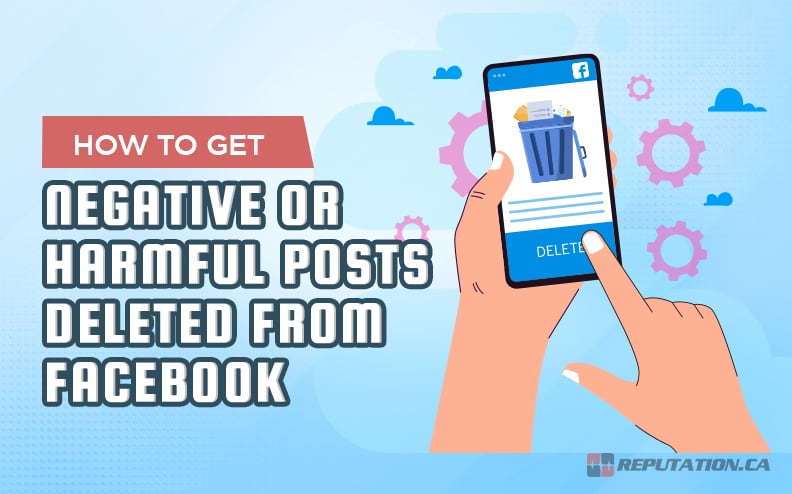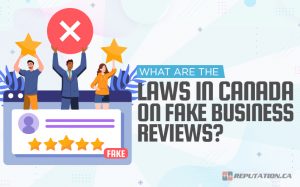Social media’s evolution has turned it into a form of communication that most people cannot go without anymore. Nowadays, the most popular platforms include Twitter, TikTok, Snapchat, and Facebook. While Facebook is a useful social media platform, it is a double-edged sword like all platforms.
The latest generation of social media users has taken to using social media to assess the reputations of those around them. This has caused many people to locate negative or harmful posts about you or that you have made and use them to discredit you.
The practice of reviewing companies and people is extremely common. While the posts they use might not be ones you made, they still serve as ammunition against you. That is why you must locate these posts and delete them as soon as possible. Unfortunately, this can be more complicated than you might think.
How to Delete Your Own Posts
One of the bigger issues affecting individuals and companies is when a post is misunderstood as harmful or offensive to a certain demographic. Even if the post was meant to be harmless or was framed as a joke, people might take offense to the comment and claim you did so intentionally.
Keeping up with what is considered inappropriate can be difficult as slang and trends evolve to accommodate the newest generation. Unfortunately, remaining ignorant of these trends can cause you to offend a demographic inadvertently unknown to you.
While the most common program for this issue seems to be Twitter, Facebook can be just as difficult to navigate. Fortunately, Facebook allows its users to remove their own posts at will, so you can delete any negative posts you might have made.
Deleting your Facebook posts is remarkably easy and can be done from the webpage or the mobile app.
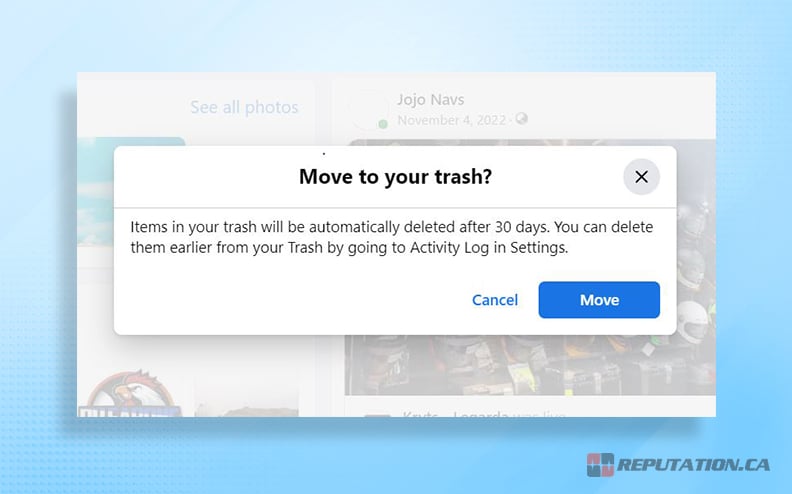
To delete a harmful post you made, you need to follow these instructions:
- Login into your Facebook account and go to your profile page by clicking on your profile picture in the top right corner.
- Once on your profile, scroll through your timeline to locate the post damaging your reputation. Once you have found it, look for the three dots on the top right of the post to access the dropdown menu.
- From the dropdown menu, you will be greeted with the option to either archive the post or move it to your trash. To delete the post, you will want to click the option “Move to Trash.”
Once a post has been moved to your trash, Facebook will automatically delete it permanently after 30 days. If you want to delete it immediately, you must complete an additional step. Near the top of your profile, another button with three dots will open another dropdown menu. In the middle of the menu, there is an option that says “Activity log” that you must click to access a new page.
On that page, there will be a tab that says “Trash” that you must click on next to access a list of all posts you have added to trash. You can select those posts and hit the “Delete” button on the top of the page to permanently delete those posts instantly.
While deleting the posts removes them from immediate view, your profile remains available for any Facebook user to access. If you want to protect your profile against further scrutiny, there is another thing you must do to secure your account.
How to Restrict Access to Your Account
There is a reason Facebook is harder to use for those looking for ammunition against a certain person. Unlike Twitter, which focuses on retweeting posts and making your opinions known to the public, Facebook posts are not regularly circulated.
When a post is found, it can lead right back to your page and give others insight into your personal and professional background. This means that your comments outside the office could easily be traced back to your employer, or they could compromise your personal life by giving them a reason to discredit you publicly. Ultimately, this affects your business or prevents you from being hired elsewhere. That is why it is important to keep your Facebook account private so that posts and jokes between you and your friends are not a public spectacle.
Luckily, making your Facebook profile private is almost as easy as deleting your posts.
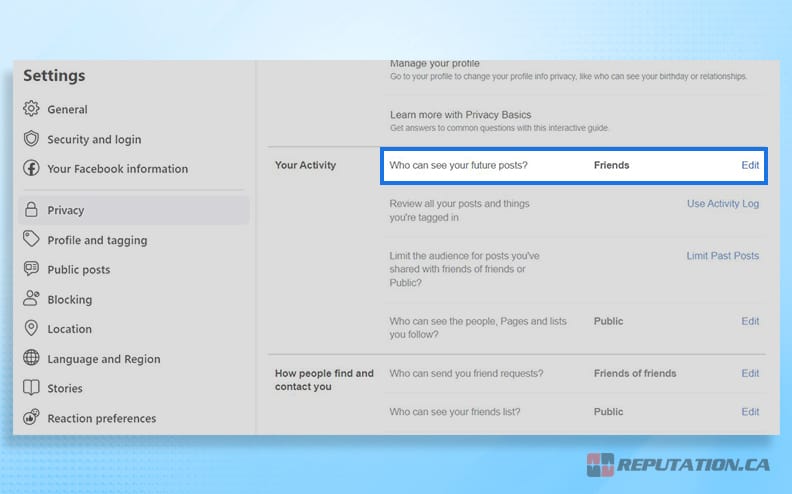
You need to follow these steps to set your account to private:
- Login into your Facebook account and click on your profile picture in the top right corner to access the dropdown menu.
- Near the top of the menu will be an option labeled “Settings & privacy” that you must click to access a submenu. Click the “Options” tab in the submenu to be redirected to your account settings.
- On the account settings page will be a tab that says “Privacy” that you will click on next to access a series of options about your account’s privacy settings.
- There are 2 important sections you will need to peruse to make your profile private effectively. These are:
- Your Activity
- How people find and contact you
- In the “Your Activity” section, you will want to access the options labeled “Who can see your future posts?” and “Who can see the people, Pages and lists you follow?”. Once you click on each section, there will be a box with a dropdown menu you will access and set to “Friends” to prevent anyone who is not on your friends list from accessing your posts and contact information.
- In the “How people find and contact you” section, you will want to alter all 5 subsections. Set the first one to “Friends of friends,” the second to “Friends,” the third and fourth ones to “Only me,” and the fifth to “No.” This will limit who will be able to locate or access your Facebook profile.
Making these adjustments will isolate your profile from anyone outside your circle of friends and family. Assuming they have no desire to cancel you, your profile will be fairly safe from scrutiny. You will also want to ensure you have a particularly strong password to combat hack attempts by outside sources. Setting your personal account to private will do little to protect a business profile where a negative post was made, but it can protect your business from any fallout on your personal page.
While this can be highly effective, it does not protect you completely since you are not the only Facebook user. Limiting your profile will not stop others from making posts about you that might harm your reputation. If you want to take down someone else’s post, you will face a greater challenge than any other technique listed in this article.
Note that the above steps apply to individuals with personal pages, not to businesses using a business page. Business pages are meant to be public and cannot easily be taken private in the same way.
How to Delete Other People’s Posts About You
Managing your Facebook profile is easy because you retain complete control over the content you post. Unfortunately, this absolute control you enjoy extends to anyone else posting about you or your business. This means you cannot use the steps outlined here to delete a post about you made by another Facebook user. There are tools you can use to limit your association with these posts, but an outright deletion is seldom an option.
To start, one of the common tools available to Facebook users is the tagging system that allows them to link their posts to another Facebook page. This helps spread the name and provide access to the other page to minimize the searching readers have to do to find the profile. While this is usually harmless among friends, if the poster’s profile is set to public, it can have severe ramifications.
If you have been tagged in a post damaging your reputation, you have limited control over that post. When you are tagged in a post, a copy is usually posted to your page for easy access. Like all posts on your timeline, it will have those familiar 3 dots that open the options dropdown menu. Unlike posts you make yourself, there will be no delete or trash option, but there will be an option to remove the tag for your page. Clicking this option will eliminate the tag and make it more difficult for strangers to access your page, but it will not delete the post. Even if your profile is private, your name will still be written out on the post without a hyperlink.
If you want to delete the post made by another party, you will only have one option available. You will have to reach out to the person who made the post and ask them to remove it. Understand that the poster is not obligated to honor your request and can say “no,” leaving the post available for all to see. This can be disappointing, but it falls within the rights of the other users not to let another dictate what they post. If they refuse to remove the post, you will have to employ damage control counter posts to explain the context or apologize to any demographics you might have offended.
While you cannot delete a post made by another Facebook user, there is a way to have the post removed. If the post is harmful or violates Facebook’s terms of service, you can go over the user’s head and report it to Facebook. Like all options outlined in this article, reporting someone else’s post is simple.
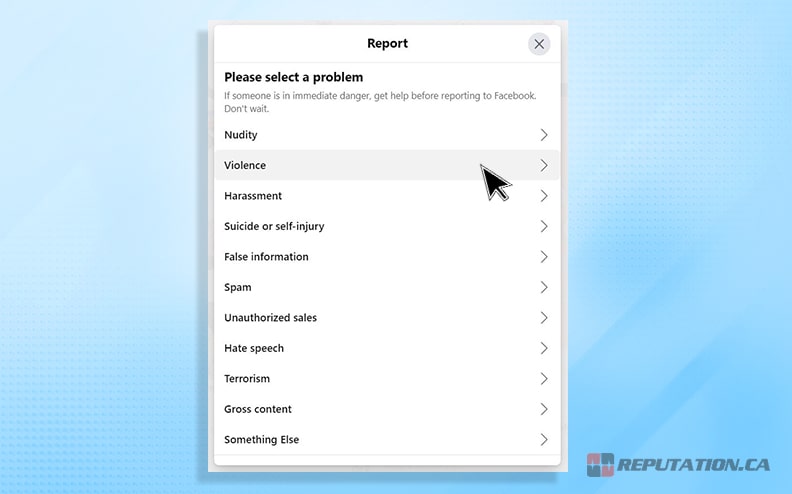
To report a post, you will have to perform the following steps:
- Login into Facebook and locate the post about you on your timeline. Like before, click on the 3 dots to access the dropdown menu.
- In the dropdown menu will be a button that says “Report.” Click this button to submit a report to Facebook’s moderation team.
- When you click the “Report” button, you will see a list of reasons why you are reporting the post. Select the one relevant to your situation, likely “False information” or “Harassment,” given the circumstances, and hit the “Submit” button.
Remember that you are only reporting the post for Facebook’s moderators to review. They might not agree with your report and dismiss it, leaving the post untouched. If the post genuinely violates the terms of service or threatens you, it will likely be deleted. Otherwise, there is nothing else you can do.
Unfortunately, Facebook’s moderation team is notoriously short-staffed and stressed, so reports can take ages to be reviewed or are ignored entirely. During this time, you may need to embark on a reputation management campaign to protect your image, refute the claims made in the original post, or otherwise fight back. You may also want to consult with a lawyer to see if the posts about you could constitute defamation and take the appropriate legal action.
Take Your Reputation Back!
Social media is the ultimate double-edged sword of the modern century. For many, it is a powerful tool for connecting with others worldwide. For others, it is a weapon to discredit people and companies that run afoul of their ideals and principles. The current sociopolitical climate dictates caution when publicly posting on social media. Otherwise, you might end up associated with a post that earns you the ire of other users. To avoid this issue, you must carefully cultivate and curate your online presence to ensure you do not run afoul of these other groups. Unfortunately, managing your social media platforms can be difficult without assistance, but you do not have to do it alone.

We at Reputation specialize in reputation marketing and management to protect our clients from reputational damage. Among our services is social media management, in which we scan your profiles and remove harmful posts to minimize the impact. Our services are readily available for individuals and companies alike, meaning no client is too small for our business. Managing your reputation in modern society can be challenging, so why do it alone? Visit our website and take your reputation back!




